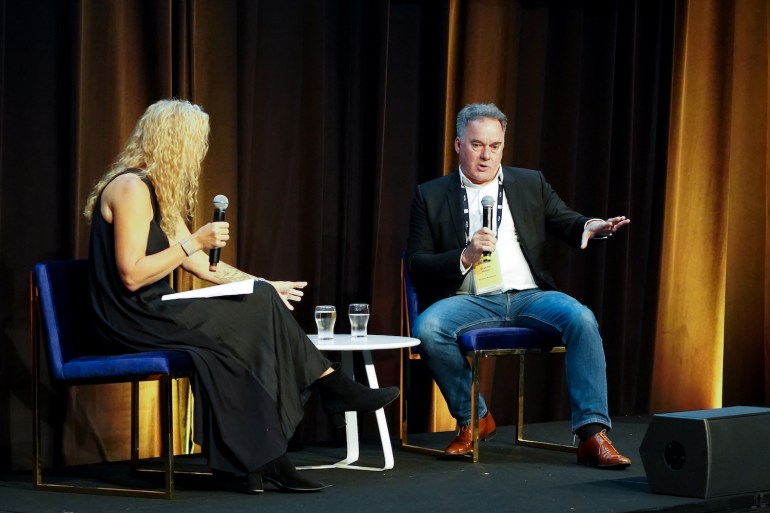Are Australian films and television series cutting through globally? The short answer from Screen Australia CEO Graeme Mason: No.
“Being blunt, absolutely not. Not nearly to the level they need to,” Mason told Screen Forever delegates today in a Q&A session with Hoodlum Entertainment chief content officer and Screen Producers Australia president Tracey Vieira.
While pointing to the global success of TV series such as The Secret She Keeps, The Newsreader and Bump, and films such as Danny and Michael Philippou’s Talk to Me, recently sold to A24 at Sundance in a seven figure deal and Goran Stolevski’s Of An Age, Mason said there are simply not enough Australian projects finding international sales and resonance.
“I think we all have to really think why,” Mason said.
“Why aren’t our shows returning more money to you, the creators, which is key? How do we do that? Because the two things on that is a) you get some money for all the work you’ve been doing for years, and secondly, you’re much more likely to get an investment in your next show from script.”
At MIPCOM last year, the Screen Australia team talked to all the sales companies – those who were handling Australian content, and those who were not. They asked what they thought was good about the content coming through, what was bad, and what they would want to change.
“Almost exactly the same comment was coming from all of them. So for those of you working in telly here, the comments were almost exclusively that our pacing is wrong and our shows are shot in a way which feels very old fashioned,” Mason said.
“I understand exactly why producers do that: Your budget’s really tight, your time’s really limited. You don’t have time in the writers room. You don’t have time to experiment on set. You don’t have the cash. So we all understand that. But I still think it’s therefore, how can we share that intel better? How can we make sure commissioners are hearing it, productions are hearing it? How do we work with both production companies and the guilds to shift that ship?
“In film, it’s a different story. It’s almost exclusively about: You’re making films that no one is going to buy a ticket to. That’s a different conversation. So they weren’t criticising the quality or the type of film.
“A great example of that reversed would be The Stranger, which was in Cannes last year. That would have had very limited box office in theatrical. But then the sales agent [CAA Media Finance and Rocket Science] sold it to Netflix, and it was one of Netflix’s biggest English language shows. The audience is still there for it, it’s just working out how to get to them.
“And I don’t know whether we necessarily, as a sector, spend the time working out what [the] international [marketplace] is doing.”
One of the difficulties Mason observed was that for many production companies, the focus was often on just getting that next commission to cover overhead costs. “I think people are so stuck surviving that it’s very hard to see that bigger picture. That would be my biggest comment. I think that’s really problematic.”
He went on to say there needs to be much more done in the sector collectively towards business sustainability, and again, that solving that issue would likely require offshore investment.
“There is finite money in this country, and there’s more people who are looking for support than can be done. So we have to think about how can we help those companies become more sustainable, but it also comes down to making content which is going to make more money; following it through, chasing that long tail.”
With many international buyers looking for broad and commercial projects, Mason said that what Australian projects are often missing is a distinctiveness.
“If you’re making a TV show and either a commissioner tells you or you just decide to make it look like an American show, but set it in Melbourne – well, the buyer’s going to buy the American show.”
Again, he pointed to the specificity of Of An Age, a queer Melbourne love story set in the ’90s, and Talk to Me, an elevated genre film, as part of the reason for their success. “Both those films are distinctive. I can see the poster. I can see the trailer. And as I say, they sold, both of them, for the world.”
With Mason to finish up with Screen Australia in November after what will be a ten year tenure, Vieira also asked the executive some reflective questions, including what the industry may not understand about what it is like to interface with government.
“I think we assume they know a lot more about us than they do,” he said.
“I think we’ve got to think much more clearly about making sure they understand the whole ecosystem of what we bring, culturally, creatively and commercially. And they don’t. These people are dealing with a whole lot of stuff – that’s both the departments and ministers.
“Probably the most cut through I’ve had in the whole time I’ve been here is with DFAT; with ambassadors and consul-general in key places. LA, easy. Even ambassador to the US, pretty easy. Ambassador to Germany, ambassador to France – I’ve hosted functions for each one of them this year already. They understand what you do to promote Australia and your businesses probably more than most people in Canberra.”
What is Mason most proud of having done at Screen Australia? “Supporting a whole lot of you to make great content. It sounds glib, but it’s actually true.
“The bigger thing I’d say I’m really proud of is we’ve moved to tell more stories to a range of audiences.”



